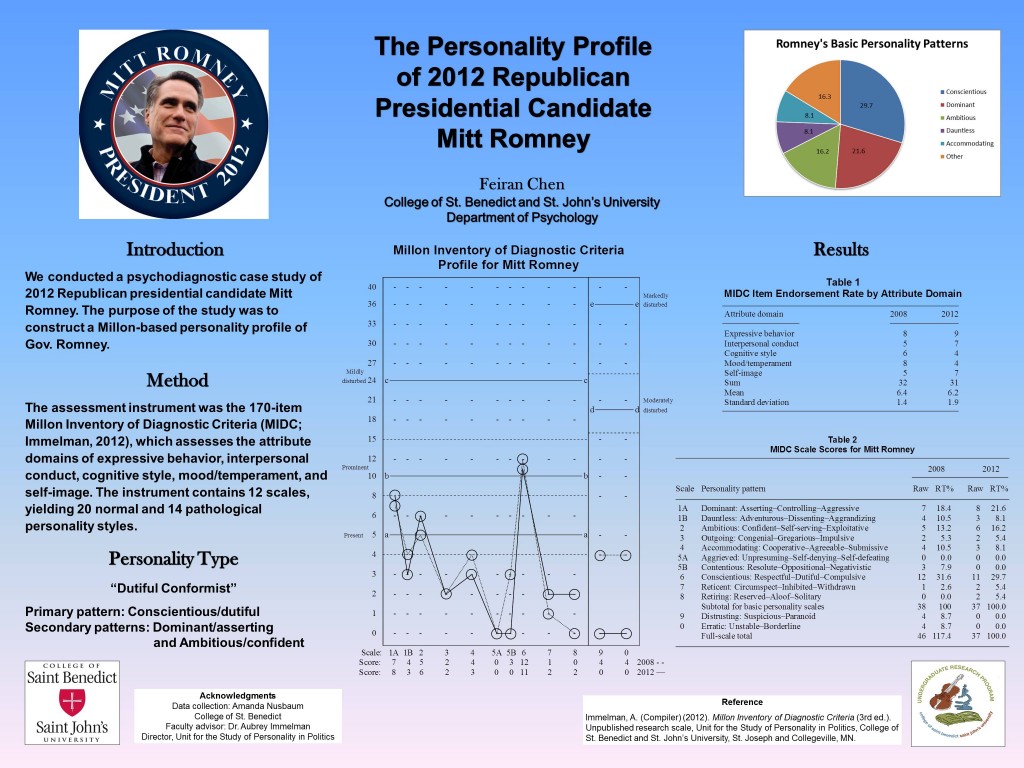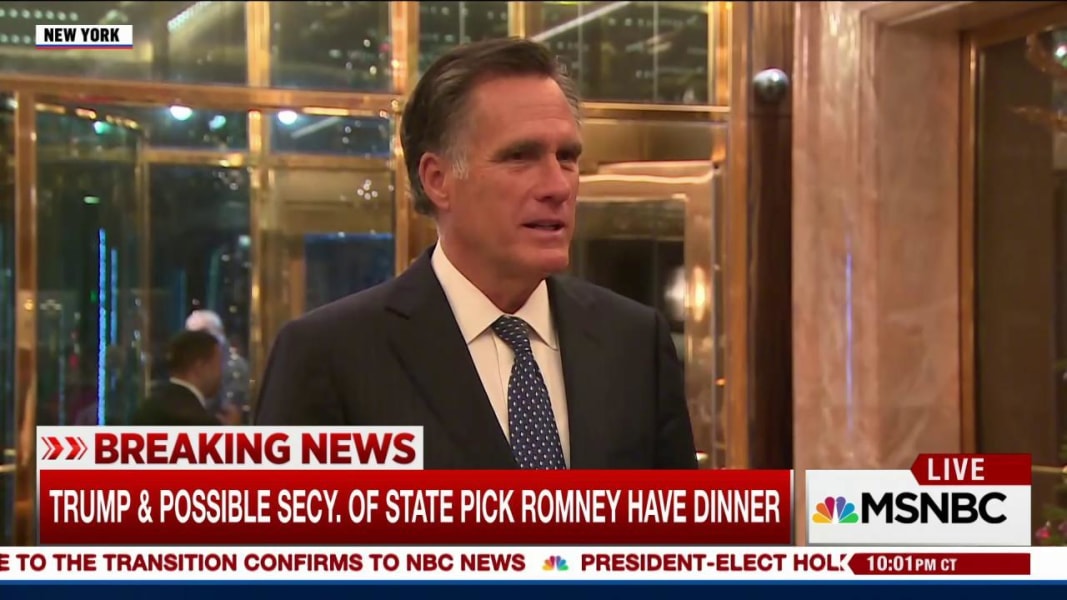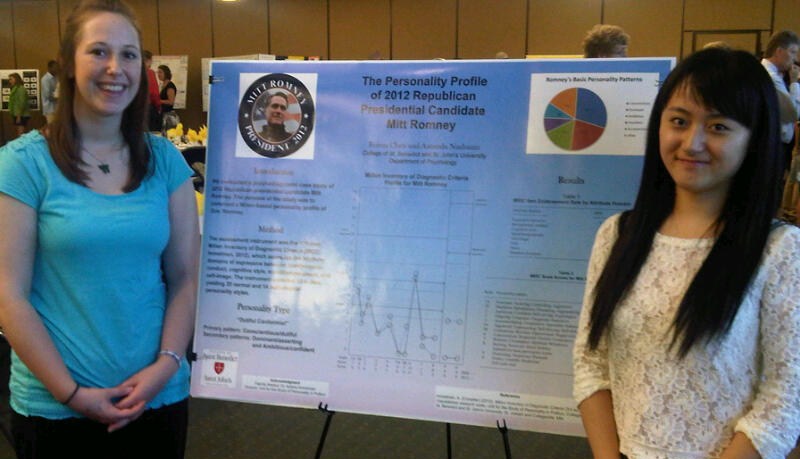Featured Posts

- Index of Psychological Studies of Presidents and Other Leaders Conducted at the Unit for the Study of Personality in Politics
- The Personality Profile of U.S. Supreme Court Associate Justice Brett Kavanaugh
- The Leadership Style of North Korean Leader Kim Jong-un
- North Korea Threat Assessment: The Psychological Profile of Kim Jong-un
- Russia Threat Assessment: Psychological Profile of Vladimir Putin
- The Personality Profile of 2016 Republican Presidential Candidate Donald Trump
- Donald Trump's Narcissism Is Not the Main Issue
- New Website on the Psychology of Politics
- Unit for the Study of Personality in Politics --- 'Media Tipsheet'
categories

- Afghanistan (228)
- Al Gore (2)
- Amy Klobuchar (4)
- Ayman al-Zawahiri (7)
- Barack Obama (60)
- Ben Carson (2)
- Bernie Sanders (7)
- Beto O'Rourke (3)
- Bill Clinton (4)
- Bob Dole (2)
- Campaign log (109)
- Chris Christie (2)
- Chuck Hagel (7)
- Criminal profiles (8)
- Dick Cheney (11)
- Domestic resistance movements (21)
- Donald Trump (31)
- Economy (33)
- Elizabeth Warren (4)
- Environment (24)
- George H. W. Bush (1)
- George W. Bush (21)
- Hillary Clinton (9)
- Immigration (39)
- Iran (43)
- Iraq (258)
- Jeb Bush (3)
- Joe Biden (13)
- John Edwards (2)
- John Kasich (2)
- John Kerry (1)
- John McCain (7)
- Kamala Harris (5)
- Kim Jong-il (3)
- Kim Jong-un (11)
- Law enforcement (25)
- Libya (18)
- Mahmoud Ahmadinejad (6)
- Marco Rubio (2)
- Michael Bloomberg (1)
- Michele Bachmann (173)
- Mike Pence (3)
- Military casualties (234)
- Missing person cases (37)
- Mitt Romney (13)
- Muqtada al-Sadr (10)
- Muslim Brotherhood (6)
- National security (16)
- Nelson Mandela (4)
- News (5)
- North Korea (36)
- Osama bin Laden (19)
- Pakistan (49)
- Personal log (25)
- Pete Buttigieg (4)
- Presidential candidates (19)
- Religious persecution (11)
- Rick Perry (3)
- Rick Santorum (2)
- Robert Mugabe (2)
- Rudy Giuliani (4)
- Russia (7)
- Sarah Palin (7)
- Scott Walker (2)
- Somalia (20)
- Supreme Court (4)
- Syria (5)
- Ted Cruz (4)
- Terrorism (65)
- Tim Pawlenty (8)
- Tom Horner (14)
- Tributes (40)
- Uncategorized (50)
- Vladimir Putin (4)
- Xi Jinping (2)
- Yemen (24)
Links

archives

- November 2021
- January 2021
- November 2020
- October 2020
- September 2020
- August 2020
- July 2020
- April 2020
- March 2020
- February 2020
- January 2020
- December 2019
- October 2019
- July 2019
- May 2019
- April 2019
- March 2019
- February 2019
- January 2019
- December 2018
- September 2018
- August 2018
- July 2018
- June 2018
- April 2018
- March 2018
- February 2018
- January 2018
- August 2017
- July 2017
- June 2017
- May 2017
- April 2017
- February 2017
- January 2017
- December 2016
- November 2016
- October 2016
- September 2016
- August 2016
- July 2016
- June 2016
- May 2016
- April 2016
- March 2016
- February 2016
- January 2016
- December 2015
- November 2015
- October 2015
- September 2015
- August 2015
- July 2015
- June 2015
- May 2015
- April 2015
- March 2015
- February 2015
- January 2015
- December 2014
- November 2014
- October 2014
- September 2014
- August 2014
- July 2014
- June 2014
- May 2014
- April 2014
- March 2014
- February 2014
- January 2014
- December 2013
- November 2013
- October 2013
- September 2013
- August 2013
- July 2013
- June 2013
- May 2013
- April 2013
- March 2013
- February 2013
- January 2013
- December 2012
- November 2012
- October 2012
- September 2012
- August 2012
- July 2012
- June 2012
- May 2012
- April 2012
- March 2012
- February 2012
- January 2012
- December 2011
- November 2011
- October 2011
- September 2011
- August 2011
- July 2011
- June 2011
- May 2011
- April 2011
- March 2011
- February 2011
- January 2011
- December 2010
- November 2010
- October 2010
- September 2010
- August 2010
- July 2010
- June 2010
- May 2010
- April 2010
- March 2010
- February 2010
- January 2010
- December 2009
- November 2009
- October 2009
- September 2009
- August 2009
- July 2009
- June 2009
- May 2009
- April 2009
- March 2009
- February 2009
- January 2009
- December 2008
- November 2008
- October 2008
- September 2008
- August 2008
- July 2008
meta

Sen. Mitt Romney (R-Utah) was the only member of the Republican Party to vote with Democratic senators to convict President Donald Trump of abuse of power in a 52-48 not guilty vote after harshly criticizing Trump in his Senate floor speech announcing his intended vote.
Romney asserted that “the president committed an act so extreme and egregious that it rises to the level of a high crime and misdemeanor”; accused him of being “guilty of an appalling abuse of public trust” for what he called “a flagrant assault on our electoral rights, our national security, and our fundamental values”; and concluded that “corrupting an election to keep oneself in office is perhaps the most abusive and destructive violation of one’s oath of office” that he could imagine.
This was not the first time Romney publicly lambasted Trump. In an op-ed published in the Washington Post a year earlier, Romney wrote that Trump had “not risen to the mantle of the office,” adding that a president “should demonstrate the essential qualities of honesty and integrity, and elevate the national discourse with comity and mutual respect.”
Similarly, Romney sharply rebuked the president’s actions outlined in special counsel Robert Mueller’s report, saying, “I am sickened at the extent and pervasiveness of dishonesty and misdirection by individuals in the highest office of the land, including the president,” implying Trump had “strayed from the aspirations and principles of the founders.”
Granted, motives can be complex and difficult to discern, yet Romney’s personality profile offers at least a partial glimpse into his underlying motivation for bucking the GOP party line with his impeachment vote.
A psychological study of Mitt Romney conducted at the Unit for the Study of Politics during Romney’s 2012 presidential campaign revealed that “Romney’s primary personality pattern was … Conscientious/dutiful, complemented by secondary Dominant/asserting, Ambitious/confident, and Accommodating/cooperative features and a minor Retiring/reserved tendency” and characterized him as quintessentially “prudent, proper, dignified, dependable, and more principled than most personality types.”
Regarding his primary personality pattern of conscientiousness, Romney’s political-psychological profile depicts him as a principled person who does his best to uphold conventional rules and standards and to follow regulations closely, with a tendency to be intolerant of deviance and judgmental of those fail to adhere to those norms.
As stated in Romney’s profile, conscientious individuals “tend to follow standards from which they hesitate to deviate, attempt to act in an objective and rational manner, and decide matters in terms of what they believe is right.†They are often religious, and maintaining their integrity “ranks high among their goals†while “voicing moral values gives them a deep sense of satisfaction.â€
As Romney asserted in his Senate floor speech:
As a senator-juror, I swore an oath before God to exercise impartial justice. I am profoundly religious. My faith is at the heart of who I am. I take an oath before God as enormously consequential.
In summary, Romney’s personality profile contains the following observations across the matrix of attribute domains comprising his overall personality composite:
- Expressive behavior: scrupulous in matters of morality and ethics, but may strike others as prudish, moralistic, and condescending. (p. 11)
- Interpersonal conduct: unbending in his relations with subordinates [which Trump arguably embodies in his capacity as a defendant in an impeachment trial], insisting they adhere to personally established rules and methods. (p. 11)
- Cognitive style: concerned with matters of propriety and tends to be rigid about regulations and procedures. (p. 11)
- Mood/temperament: dignified, serious minded, solemn demeanor. (p. 12)
- Self-image: values aspects of himself that exhibit virtue and moral rectitude. (p. 12)
- Morphologic organization/ego-defense mechanism: public facade of conformity and propriety may mask an undercurrent of repressed urges toward self-assertion and defiance. (p. 13)
Finally, the section on leadership implications in the report of Romney’s political personality concludes that, in his policy choices, consensus building likely plays a secondary role to the implementation of the “morally correct” policy. (p. 17)
Objective assessment of the psychological motives underlying Romney’s “guilty” impeachment vote dictates that he was simply acting in character and in accordance with his deeply held personal and religious values. However, that determination belies the probability that some of Romney’s Republican Senate colleagues possess a similar personality profile and set of values.
What, then, could account for Romney’s dissenting vote?
One clue may be implicit in Trump’s public humiliation of Romney, whom the president called “a pompous ‘ass’” who had been “fighting me from the beginning, except when he begged me for my endorsement for his Senate run … and when he begged me to be Secretary of State.”
In that regard, it’s notable that Romney’s personality profile is suggestive of an individual more likely to nurse grudges than most. From that perspective, an alternative explanation for Romney’s vote might be that he gave the president a taste of his own kind of quid pro quo.
Cited report
The Political Personality of 2012 Republican Presidential Candidate Mitt Romney. Paper presented by Aubrey Immelman at the 35th Annual Scientific Meeting of the International Society of Political Psychology, Chicago, July 6–9, 2012. Abstract and link for full-text (35 pages; PDF) download at Digital Commons: http://digitalcommons.csbsju.edu/psychology_pubs/98/
Related reports on this site
What Motivates Mitt Romney to Question Donald Trump’s Character? (Jan. 3, 2019)

Click on image for larger view
Mitt Romney Announces Bid for U.S. Senate in Utah (Feb. 17, 2018)
Mitt Romney for Secretary of State? (Nov. 19, 2016)

Mitt Romney’s Personality Profile (June 2, 2011)

As shown in the pie chart, Romney has a primarily Conscientious-dutiful personality, complemented by secondary Dominant-asserting, Ambitious-confident, and Accommodating-cooperative features and a minor Retiring-reserved tendency.
Mitt Romney’s Leadership Style (Sept. 3, 2012)

Research assistants Amanda Nusbaum and Feiran Chen presented their research on “The Personality Profile of 2012 Republican Presidential Candidate Mitt Romney†at the College of St. Benedict in St. Joseph, Minn., July 30, 2012.
Why Mitt Romney Won’t Be President — In Theory (Oct. 29, 2012)

Aubrey Immelman and Andrew Obritsch in Chicago at the annual scientific meeting of the International Society of Political Psychology to present their research on Barack Obama and Mitt Romney, July 2012.
You must be logged in to post a comment.


